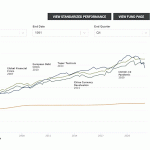
The Merger Fund® Interactive Chart
See how The Merger Fund® can diversify traditional stock and bond portfolios in an interactive way.
Merger arbitrage is an absolute return strategy of investing in companies involved in pending mergers, takeovers, and other corporate reorganizations, with the goal of profiting from the timely completion of these transactions. Each investment tends to trade on idiosyncratic deal dynamics and normally exhibits low correlation with other investments in a portfolio. In other words, the outcome of a single transaction will likely not impact the outcome of other portfolio investments. In contrast to traditional long-only strategies, investment returns are driven primarily by the outcome of the specific transaction rather than the direction of equity or bond markets.
The commentary is the opinion of the subadviser. This material has been prepared using sources of information generally believed to be reliable; however, its accuracy is not guaranteed. Opinions represented are subject to change and should not be considered investment advice or an offer of securities.
IMPORTANT RISK CONSIDERATIONS: Fundamental Risk of Investing: There can be no assurance that the portfolio will achieve its investment objectives. An investment in the portfolio is subject to the risk of loss of principal; shares may decrease in value. Merger-arbitrage & Event-driven: Merger-arbitrage and event-driven investing involve the risk that the adviser’s evaluation of the outcome of a proposed event, whether it be a merger, reorganization, regulatory issue, or other event, will prove incorrect and that the Fund’s return on the investment may be negative. Short Sales: The portfolio may engage in short sales and may incur a loss if the price of a borrowed security increases before the date on which the portfolio replaces the security. Foreign: Investing in foreign securities subjects the portfolio to additional risks such as increased volatility, currency fluctuations, less liquidity, and political, regulatory, economic, and market risk. Portfolio Turnover: The portfolio’s principal investment strategies may result in a consistently high portfolio turnover rate. A higher portfolio turnover rate may indicate higher transaction costs and may result in higher taxes when the portfolio is held in a taxable account. Credit & Interest: Debt instruments are subject to various risks, including credit and interest rate risk. The issuer of a debt security may fail to make interest and/or principal payments. Values of debt instruments may rise or fall in response to changes in interest rates, and this risk may be enhanced with longer-term maturities. Derivatives: Investments in derivatives such as futures, options, forwards, and swaps may increase volatility or cause a loss greater than the principal investment. Hedging: The portfolio’s hedging strategy will be subject to the portfolio’s investment adviser’s ability to correctly assess the degree of correlation between the performance of the instruments used in the hedging strategy and the performance of the investments in the portfolio being hedged. Market Volatility: Local, regional, or global events such as war, acts of terrorism, the spread of infectious illness or other public health issues, recessions, or other events could have a significant impact on the portfolio and its investments, including hampering the ability of the portfolio manager(s) to invest the portfolio’s assets as intended. Prospectus: For additional information on risks, please see the fund’s prospectus.
Please consider a Fund’s investment objectives, risks, charges, and expenses carefully before investing. For this and other information about any Virtus Fund, contact your financial professional, call 800-243-4361, or visit virtus.com for a prospectus or summary prospectus. Read it carefully before investing.